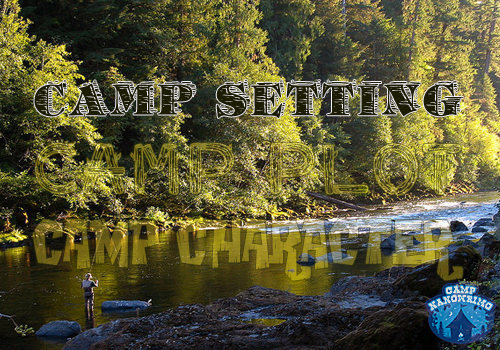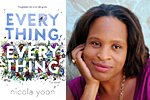Choose Your Camp: How Setting Can Reinvent Your Story

Camp NaNoWriMo begins in April! In the spirit of friendly camp competition (and inspired by one of our favorite scenes in Scott Westerfeld’s Afterworlds), we asked our friends to Choose Your Camp. Nicola Yoon and David Yoon, author and illustrator respectively of the forthcoming book, Everything, Everything, share how setting can act as a minor god:
It’s often said that setting acts as character in a story: it’s true that settings can have their own personalities and moods like people, but a setting can also do many things people can not. I like to think of settings as omniscient and powerful minor gods with near-total control over your protagonist and plot. A setting can mirror the mindset of your heroine, or it can fight against her wishes. It can let her hide away or force her to reveal her true self before she’s ready. A setting can be your heroine’s best friend or worst enemy or both—sometimes in the blink of an eye…
A great example of setting is in Dave Eggers’ A Hologram for the King, which is a Waiting for Godot-like tale about an American tech salesman lost in Saudi Arabia. Eggers presents the desert as both a blank canvas full of potential as well as an unfamiliar world full of alienation, and indeed his hero vacillates between feelings of self-reinvention and total impotence. Many of the scenes take place on construction sites, not only mirroring the hero’s own incompleteness but also providing the character various plot possibilities to get entangled in.
Settings help drive the plot and character. Sometimes I use the fish-out-of-water approach, placing a character in a setting she would never normally be in to see what choices she makes. Other times I place a character in her favorite setting, like a calm and relaxing ocean on a summer day. Then, I turn the setting against her to see how she reacts to the sudden betrayal as that same soothing ocean churns, becoming indifferent and deadly.
One of my favorite ways to use setting is as a setup for things to come, things I don’t want to belabor through excessive expository dialogue or plot. A young couple enters a much too small hotel room with a comically large bed, for example. Their new love for each other and the physical possibilities that come with it are all reflected in this room without either of them having to say a thing.
Finally, a setting cannot simply be. At the very least it must do the job of ostranenie, or of making ordinary things seem strange and new. Imagine how a parking lot would look to a baby, or a newly arrived extra-terrestrial. In my case for my book—Everything, Everything—I had to imagine how the world would look to a girl who’d never left her house in all of her seventeen years: freeway traffic, wind, flowers.
The world is filled with all kinds of beauty—pleasing, ugly, unconformable and conflicting. There’s a thrill that comes with seeing the mundane reinvented into something exotic on the page. It’s our job as writers to keep our readers enthralled. Setting can help us do that.

Nicola Yoon grew up in Jamaica (the island) and Brooklyn (part of Long Island). She currently resides in Los Angeles, CA with her husband and their daughter, both of whom she loves beyond all reason. Her first novel, Everything, Everything , will be published by Random House Children’s Books on September 1, 2015. Follow her on Twitter\Tumblr: @NicolaYoon
David Yoon is a writer and designer. He lives with his wife Nicola Yoon in Los Angeles, CA, where they spend their days talking about stories and reading (many, many) books to their 3-year-old daughter. David created the illustrations for Everything, Everything.
Top photo background by Flickr user BLMOregon.
Chris Baty's Blog
- Chris Baty's profile
- 63 followers



